The Illustrious Lineage and Early Life
Khwaja Moinuddin Chishti (H.A.), revered as HabibAllah (the Beloved of Allah), was born into a noble and radiant lineage, tracing directly to the Holy Prophet Muhammad ﷺ through both his maternal (Hassani) and paternal (Hussaini) lines.
His father, Khwaja Ghiyasuddin Hasan (R.A.), was a direct descendant of Hazrat Imam Hussain (A.S.), the beloved son of Hazrat Ali (K.W.K.). His mother, Umm-ul-Warah (R.A.), affectionately known as Bibi Mah Noor, connected his lineage to Hazrat Imam Hasan (A.S.). This profound ancestry underscores his spiritual eminence and the divine blessings bestowed upon him.
Born in the region of Sistan, a land often gripped by unrest due to invasions, his family migrated to the spiritually vibrant and intellectually rich lands of Khūrāsan, seeking peace and knowledge. From a tender age, Khwaja Moinuddin Chishti (H.A.) radiated compassion and divine sensitivity. His innate generosity was evident even as a child; on Eid, he would give his own clothes to a blind child and accompany him to prayer. He preferred sharing meals with others over play, foreshadowing his future as a profound giver of divine love and a patron of the poor.
His early education began within the sacred confines of his home, where he memorized the Holy Qur'an by the age of nine. He later immersed himself in Hadith and Fiqh at a maktab, completing his studies with remarkable intellectual brilliance and divine blessing. At the age of fifteen, he experienced the heart-wrenching loss of his father during the Tatar invasions in Khorasan. This sorrow deeply etched into his soul, planting the seed of spiritual yearning that would ultimately shape his entire life and mission.
The Transformative Spiritual Journey
One fateful day, in the sacred season between Sha'aban and Zul-Hijjah of 544 AH / 1150 AD, while tending to his orchard, Khwaja Moinuddin Chishti (H.A.) received an unexpected guest: the noble mystic, Hazrat Ibrahim Qandoozi (R.A.). With the warmth of a true host, Khwaja Sahib offered him a bunch of grapes. Moved by this affection, Hazrat Qandoozi (R.A.) offered him a simple piece of oil cake. That humble offering, given in divine silence, awakened in Khwaja Moinuddin Chishti (H.A.) an intense yearning for truth—a pivotal moment that irrevocably altered the course of history and set him on his unparalleled spiritual path.
After his father's passing, he inherited only a grindstone and a small orchard. Yet, these modest possessions held no attachment for him. Driven by an overwhelming love for the Divine, he sold them and distributed all proceeds to the poor, orphans, and the destitute. This act of profound selflessness symbolized his detachment from worldly possessions and his complete surrender to the Divine Will, setting ablaze his ego and firmly placing him on the path of spiritual asceticism.
Thirsting for deeper wisdom, he embarked on extensive journeys to the sacred cities of Baghdad, Samarkand, and Bukhara—luminous centers of Islamic learning. For five years, he diligently studied under esteemed scholars such as Maulana Hisamuddin of Bukhara (R.A.) and Maulana Sharfuddin (R.A.), meticulously polishing both his intellect and spirit. His soul, however, continued to yearn for a deeper connection.
His quest led him farther, from Iraq to the blessed lands of Arabia and Iran, until he reached Haroon. There, Divine Providence orchestrated his meeting with Hazrat Khwaja Usman Harooni (Q.S.A.)—the revered master whose spiritual gaze had the power to transform hearts. Entrusting him with the profound secrets of the Path, Hazrat Usman Harooni (Q.S.A.) accepted him as a devoted disciple. For two and a half years, Khwaja Moinuddin Chishti (H.A.) remained under his rigorous care, undergoing intensive spiritual training and ascetic discipline. This period culminated in him being granted Khilafat—the spiritual license to guide seekers on the Sufi path.
Initiation, Hajj, and the Divine Mandate
Khwaja Moinuddin Chishti (H.A.) himself recounts the luminous details of his second spiritual initiation:
"I, Moinuddin Hasan of Sanjar, a well-wisher of the faithful, had the honor of meeting His Holiness Hazrat Khwaja Usman of Haroon in the mosque of Khwaja Junaid in Baghdad. He was surrounded by divinely inspired dervishes. When this humble soul bowed in reverence, my master and guide asked me to offer two rak'ats. I obeyed. Then he instructed me to face the Ka'ba and recite Surah Baqarah. I did so. Next, he told me to send salutations upon the Beloved Prophet ﷺ twenty-one times. I obeyed. He then rose, held my hand, lifted his gaze towards the heavens and said, 'Come, let me cause thee to reach God.' Taking out a miqraz, he passed it over my head and placed upon me the four-edged cap and bestowed the blessed robe of the path. Then he said, 'It is our tradition that a seeker must undergo a day and night of spiritual abstinence. You shall complete this now.' I obeyed."
After twenty years of dedicated service to his revered spiritual guide and teacher, Hazrat Khwaja Moinuddin Chishti (H.A.) reached a profound turning point at the age of fifty-two in Baghdad. On this significant occasion, Hazrat Khwaja Usman Harooni (Q.S.A.) honored him with the distinguished title of Sajjada Nashin, marking him as the spiritual successor. Along with this esteemed appointment, he was entrusted with the sacred relics of the Holy Prophet Muhammad ﷺ.
The Divine Spiritual Lineage (Silsila)
The divine spiritual chain (Silsila) of Hazrat Khwaja Moinuddin Chishti (H.A.) is a testament to the unbroken transmission of spiritual knowledge and blessings, tracing directly back to the Beloved Prophet Muhammad ﷺ. This sacred lineage is as follows:
- Hazrat Khwaja Moinuddin Hasan Chishti (H.A.) ← disciple of
- Hazrat Khwaja Usman-e-Harooni (R.A.) ← disciple of
- Hazrat Haji Sharif Zindani (R.A.) ← disciple of
- Hazrat Khwaja Qutubuddin Modood Chishti (R.A.) ← disciple of
- Hazrat Khwaja Nasiruddin Abu Yousuf Chishti (R.A.) ← disciple of
- Hazrat Khwaja Abu Mohammed Chishti (R.A.) ← disciple of
- Hazrat Khwaja Abu Ahmed Abdal Chishti (R.A.) ← disciple of
- Hazrat Khwaja Abu Ishaque Shami Chishti (R.A.) ← disciple of
- Hazrat Mumshad Uluvi Deenwari (R.A.) ← disciple of
- Hazrat Khwaja Aminuddin Habeera (R.A.) ← disciple of
- Hazrat Khwaja Huzaefa Marashi (R.A.) ← disciple of
- Hazrat Khwaja Ibrahim Adham Balkhi (R.A.) ← disciple of
- Hazrat Khwaja Fuzail Ibne Ayaz (R.A.) ← disciple of
- Hazrat Khwaja Abdul Wahid Bin Zaid (R.A.) ← disciple of
- Hazrat Khwaja Imam Hassan Basri (R.A.) ← disciple of
- Hazrat Imamul Auliya Sayyiduna Hazrat Ali (K.W.K.), son-in-law of
- Hazrat Imamul Ambiya Sarwar e Qayenaat Prophet Muhammad ﷺ
Prophet's Deputy (Nayab-e-Rasool): The Divine Mandate to India
After receiving the robe of caliphate from his spiritual guide and teacher, Khwaja Moinuddin Chishti (H.A.) embarked once more on a journey of sacred travels. He first reached Osh and then moved towards Isfahan, where he met Sheikh Mahmud of Isfahan. It was here that he gave the clothes he was wearing to Khwaja Qutbuddin Bakhtiar Kaki (R.A.), symbolizing his spiritual acceptance of him as a devoted disciple. From that moment in 583 AH / 1187 AD, Khwaja Qutbuddin Bakhtiar Kaki (R.A.) became his inseparable companion and spiritual heir.
That same year, Khwaja Moinuddin Chishti (H.A.) left Isfahan for Makkah. While absorbed in prayer at the Holy Ka'ba, a divine voice resonated:
"O, Moinuddin! We are greatly pleased with thee. Thou art given salvation. Ask for anything thou may'st like, so that We may grant that to thee."
With profound humility, he responded:
"O, Great God! Grant salvation to the followers and disciples of Moinuddin."
The reply came, confirming his exalted status:
"O, Moinuddin! Thou art Our accepted one. I will give salvation to thy followers and disciples, and also to those who may enter thy fold till the Day of Resurrection."
After completing Hajj and offering his heartfelt salutations at the Ka'ba, he traveled to Medina and immersed himself in prayers at the Prophet's Mosque. There, he received a direct spiritual mandate from the Court of the Holy Prophet Muhammad ﷺ:
"O, Moinuddin! Thou art a helper of My religion. I entrust to thee the country of Hindustan. There prevails darkness. Proceed to Ajmer and spread there the Gospel of Truth."
Deeply honored yet initially unsure of where Ajmer lay, he was soon enveloped in a spiritual dream in which the Holy Prophet Muhammad ﷺ revealed to him the city, its fort, and the surrounding landscape of Ajmer. Before departing, he was presented with a pomegranate from Heaven, a symbol of divine blessing and abundance for his mission.
Khwaja Moinuddin Chishti (H.A.) then reached Baghdad, and from there passed through Chisht on his way to Herat. Continuing his sacred mission, he traveled to Sabzevar, where even the ruler of the region became his spiritual disciple. From Sabzevar, he journeyed to Shadman Fort, then proceeded to Lahore via Multan. Eventually, he reached Delhi, pausing briefly at Samana in the Patiala district, and finally arrived in Ajmer for the first time in 587 AH / 1191 AD, accompanied by forty devoted followers, marking the beginning of a new spiritual era in India.
His Blessed Visit and Impact in Ajmer
Upon his arrival in Ajmer, then under the rule of a powerful king, Khwaja Moinuddin Chishti (may his soul be sanctified) sought to reside at the location where the Auliya Mosque now stands. However, the king's attendants objected, claiming it was a resting place for the royal camels. In response, Khwaja Moinuddin Chishti (may Allah be pleased with him) fearlessly stated, "If the camels sit there, let them sit." He instead settled on a nearby hill, now famously known as Chillah Khwaja Sahib.
Miraculously, the camels, upon returning to their usual spot, were unable to rise after sitting down. Upon being informed, the king was summoned, and all camel-drivers humbly apologized. Accepting their repentance, Khwaja Moinuddin Chishti (may his blessings be upon him) said, "Very well, go ahead, the camels can now stand." Upon their return, the camels were found standing, a testament to his spiritual power and divine favor.
News of the arrival of this deeply pious dervish spread rapidly, attracting an increasing number of people to him. Whoever approached him was greeted with profound kindness and bestowed with blessings. Inspired by his divine teachings, his simple yet profound wisdom, and his compassionate demeanor, many embraced Islam and became his devoted disciples, transforming the spiritual landscape of the region.
During Khwaja Moinuddin Chishti's (may Allah be pleased with him) stay in Ajmer, Shahabuddin Muhammad Ghori launched another invasion of India in 1192 AD. In the famous Battle of Tarain, he emerged victorious over the local king. Upon learning of Khwaja Moinuddin Chishti's (may his soul be sanctified) presence in Ajmer, Shahabuddin Muhammad Ghori personally visited him and received his blessings, acknowledging the saint's spiritual authority.
Khwaja Moinuddin Chishti (may his soul be sanctified) left Ajmer for brief periods, returning in 588 AH/1191 AD. He journeyed to Baghdad in 598 AH/1200 AD and, upon reaching Balkh, accepted Maulana Ziauddin (may Allah be pleased with him) as his spiritual disciple. Subsequently, he revisited Ajmer in 602 AH/1206 AD and again in 610 AH/1213 AD.
During the reign of Sultan Shamsuddin Iltutmish, Khwaja Moinuddin Chishti (may his soul be sanctified) visited Delhi twice. In 611 AH/1214 AD, he resided in the Khanqah of Khwaja Qutbuddin Bakhtiar Kaki (may Allah be pleased with him) and granted Hazrat Baba Fariduddin Ganjshakar (may Allah be pleased with him) a robe during his stay, signifying the passing of spiritual authority.
The Profound Spiritual Teachings
Spiritual Works and Literary Legacy
Khwaja Moinuddin Chishti (H.A.), a revered Sufi Saint, has bequeathed a priceless collection of Persian poetry and other profound written works. These luminous compositions, all penned in the sacred Persian language, include:
- **Anis-ul-Arwah:** A collection of his discourses and teachings.
- **Kashf-ul-Asrar:** Unveiling the secrets of spiritual realities.
- **Risala Maujudia:** A treatise on the nature of existence.
- **Hadis-ul-Ma'arif:** Sayings and wisdom on divine knowledge.
- **Diwan-e-Moinuddin:** A compilation of his Persian poetry.
These works serve as a guiding light for seekers on the Sufi path, illuminating the principles of divine love, self-purification, and service to humanity.
Core Principles of Chishti Sufism
The teachings of Khwaja Moinuddin Chishti (H.A.) are rooted in the profound principles of Islamic Sufism, emphasizing:
Love for God and Humanity
The cornerstone of his philosophy. He taught that the closest way to God is through serving His creation, fostering unconditional love for all beings regardless of their faith or background.
Renunciation of Worldly Desires
Emphasizing detachment from material possessions and worldly attachments, focusing instead on spiritual growth and the pursuit of divine proximity.
Selflessness and Humility
Encouraging devotees to cultivate humility, eradicate ego, and serve others with complete selflessness, seeing themselves as mere instruments of divine will.
Patience and Perseverance
Highlighting the importance of steadfastness in the face of adversity, trusting in divine wisdom and maintaining patience on the spiritual journey.
Tolerance and Harmony
Promoting interfaith harmony and respect for all religions, fostering an environment of peace and understanding among diverse communities.
Zikr (Remembrance of God)
Encouraging constant remembrance of God through various forms of dhikr, including silent contemplation, recitation of divine names, and spiritual music (Qawwali).
Sayings of Khwaja Moinuddin Chishti (H.A.)
The Reality of Teachings
Love for God and Humanity
Khwaja Moinuddin Chishti (H.A.) emphasized that the true essence of religion lies in loving God and His creation. He taught that serving humanity is the highest form of worship, transcending all rituals and dogmas. This unconditional love fosters unity and compassion among people of all backgrounds.
Self-Purification (Tazkiyah-e-Nafs)
He stressed the importance of purifying the inner self from negative traits like ego, greed, and anger. Through constant self-reflection, remembrance of God (dhikr), and adherence to spiritual discipline, one can achieve inner peace and draw closer to the Divine.
Simplicity and Austerity
Khwaja Moinuddin Chishti (H.A.) lived a life of profound simplicity and detachment from worldly possessions. He encouraged his followers to adopt a similar lifestyle, focusing on spiritual enrichment rather than material accumulation. This detachment frees the heart from worldly anxieties and allows it to connect with the divine.
Tolerance and Harmony
His teachings promoted interfaith harmony and respect for all religions. He believed that all paths ultimately lead to the same Divine Reality, and that true spirituality transcends sectarian divisions. This message of tolerance fostered peace and understanding in a diverse society.
Service to Humanity (Khidmat-e-Khalq)
The practical application of his teachings was service to humanity. He dedicated his life to alleviating the suffering of the poor, the needy, and the oppressed. He taught that true spiritual progress is achieved through selfless service, seeing the face of God in every human being.
Spiritual Music (Sama/Qawwali)
Khwaja Moinuddin Chishti (H.A.) recognized the power of spiritual music (Sama or Qawwali) as a means to awaken the soul and deepen one's connection with the Divine. He encouraged its use as a tool for spiritual ecstasy and remembrance of God, provided it was performed with sincerity and pure intention.
Categories of Seekers
- First Category: Those who are absorbed in the love of God and are detached from worldly desires. They are constantly engaged in the remembrance of God and strive for His pleasure.
- Second Category: Those who are engaged in spiritual practices and strive to purify their souls. They are sincere in their devotion and seek to attain spiritual knowledge.
- Third Category: Those who are engaged in worldly affairs but strive to live a righteous life. They are mindful of God in their daily activities and seek to serve humanity.
Dargah Sharif & URS
Daily Ceremonies at Dargah Ajmer Sharif
The Dargah Sharif of Hazrat Khwaja Moinuddin Chishti (H.A.) in Ajmer is a vibrant center of spiritual activity, with daily ceremonies that have been performed for centuries, maintaining the sanctity and spiritual atmosphere of the shrine. These ceremonies are a testament to the enduring legacy of Khwaja Gharib Nawaz and draw devotees from all walks of life.
Fajar (Morning) Prayer
The day begins with the congregational Fajar prayer before sunrise. Devotees gather to offer their prayers, seeking blessings for the day ahead. The serene atmosphere at dawn is particularly conducive to spiritual reflection.
Karka (Opening Ceremony)
After the Fajar prayer, the Karka ceremony takes place. This involves the opening of the main entrance of the Mazar Sharif, accompanied by the recitation of specific verses and salutations. It marks the official beginning of the day's activities at the shrine.
Zohar (Noon) Prayer
The Zohar prayer is offered in congregation at noon. Many pilgrims choose to perform their Zohar prayers within the Dargah complex, finding solace and spiritual upliftment in the sacred surroundings.
Asar (Afternoon) Prayer
The Asar prayer is performed in the late afternoon. The Dargah remains a bustling hub of activity throughout the day, with devotees continuously arriving to offer their respects and prayers.
Maghrib (Sunset) Prayer
The Maghrib prayer is offered at sunset, marking the end of the day's fasting for those observing it. The transition from day to night at the Dargah is a particularly beautiful and spiritual experience.
Isha (Night) Prayer
The Isha prayer is the final congregational prayer of the day. After Isha, the Dargah becomes quieter, allowing for more personal reflection and devotion.
Karka (Closing Ceremony)
The day concludes with the Karka (closing ceremony) after the Isha prayer. The main entrance of the Mazar Sharif is closed, and specific prayers are recited, bringing a peaceful end to the day's spiritual activities.
Langar (Community Kitchen)
Throughout the day, the Langar Khana (community kitchen) operates, providing free meals to thousands of devotees and the needy. This tradition embodies the spirit of generosity and equality taught by Khwaja Gharib Nawaz.
Qawwali (Spiritual Music)
Qawwali sessions are held regularly, especially in the evenings. This spiritual music, filled with devotional poetry, creates an atmosphere of ecstasy and remembrance of God, deeply moving the hearts of listeners.
URS Ceremony
The Urs festival is a yearly event hosted in Ajmer, Rajasthan, India, dedicated to the remembrance of the passing of the Sufi Saint, Hazrat Moinuddin Chishty (H.A.), who laid the foundation of the Chishtiya Sufi order in India. This festival spans six days and is distinguished by extended night-time sessions of dhikr (zikr), qawwali singing and Langer Niaz. The commemoration takes place during the seventh month of the Islamic lunar calendar. The shrine becomes a site of devotion, drawing thousands of pilgrims from across India and beyond.
URS Ceremony Details
The sixth day of the Urs holds a paramount significance and is regarded as highly auspicious. Referred to as "Chhati Sharif," this day unfolds on the 6th of Rajab, commencing from 10:00 A.M. until 1:30 p.m., within the precincts of the Mazaar Sharif or the shrine complex. This solemn occasion encompasses the reading of the Shijra, the genealogical lineage linked to the Chishti Order, by the devoted Khadims of Moinuddin Chishti. This is followed by Fariyad, the offering of prayers.
Preceding the Qu'l, the culmination of Chhati Sharif, a rendition of RUNG, a poetic ode of praise, resonates at the main entrance of the shrine, performed by the Qawwals. This RUNG, a recitation accompanied solely by rhythmic clapping, including the use of musical instruments. Following its recitation, the Qu'l ceremony reaches its conclusion, and Fatiha is recited. The conclusion of this ceremony is heralded by the firing of a cannon at precisely 1:30 p.m.
NOTE
These dates are estimates based on the lunar calendar and the 813th Urs schedule (January 1–15, 2025). The exact dates depend on the moon sighting for Rajab 1447 AH, and a one-day variation is possible.
THE LOVERS OF KHWAJA GHARIB NAWAZ (H.A.)
USED TO ATTEND THE URS EVERY YEAR WITH THEIR HEARTFELT AND CHERISHED WISHES AND RETURNING GO TO BRIMFUL WITH THE FRUITIONS OF THEIR INNER APPARITION. I CORDIALLY INVITE YOU AND YOUR LOVED ONES TO ATTEND THE URS FOR YOUR SPIRITUAL WELLBEING.
PLEASE INFORM ME SOON IN DETAILS ABOUT YOUR DEFINITE ARRIVAL AT AJMER SO I MAKE NECESSARY ARRANGEMENTS FOR YOUR STAY, LODGING ETC. AND TO RECEIVE YOU AT RAILWAY STATION OR AIRPORT. IF YOU WANT TO OFFER NAZR O NIAZ, OFFER CHADER AND FLOWERS, MANNAT, DUA FOR SPIRITUAL HEALING OR TO TAKE WORTHY PART IN THESE EVENTS WITHOUOUT BEING PHYSICALLY PRESENT. YOU CAN SEND ME YOUR OFFERINGS . INSHAHALLAH RECEIPT AND TABARRUK AND TAWEEZAAT WILL BE SENT TO YOU AFTER URS.
Contact Us for Urs ArrangementsImage Gallery
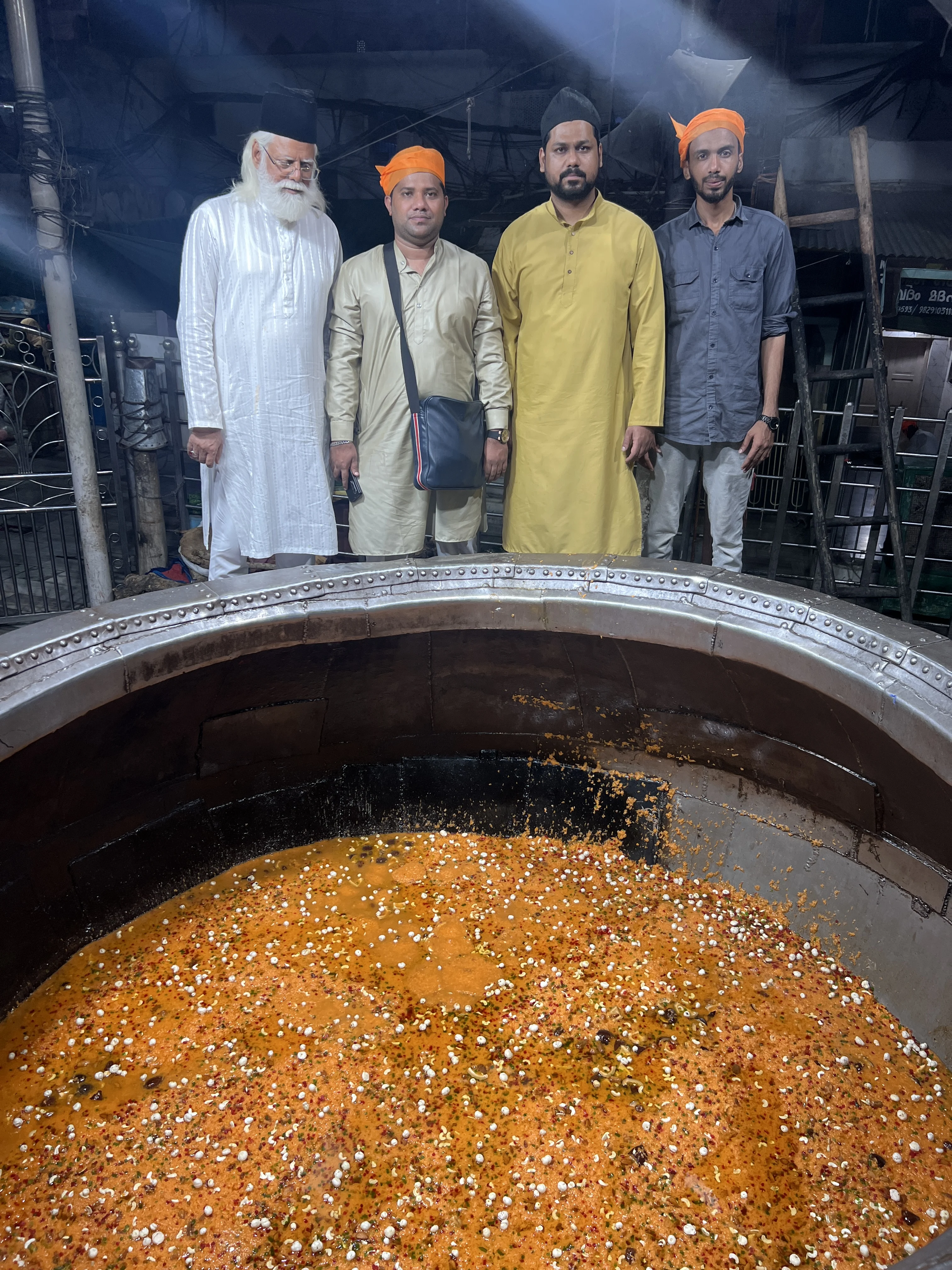
Sacred Deg Offering Langar
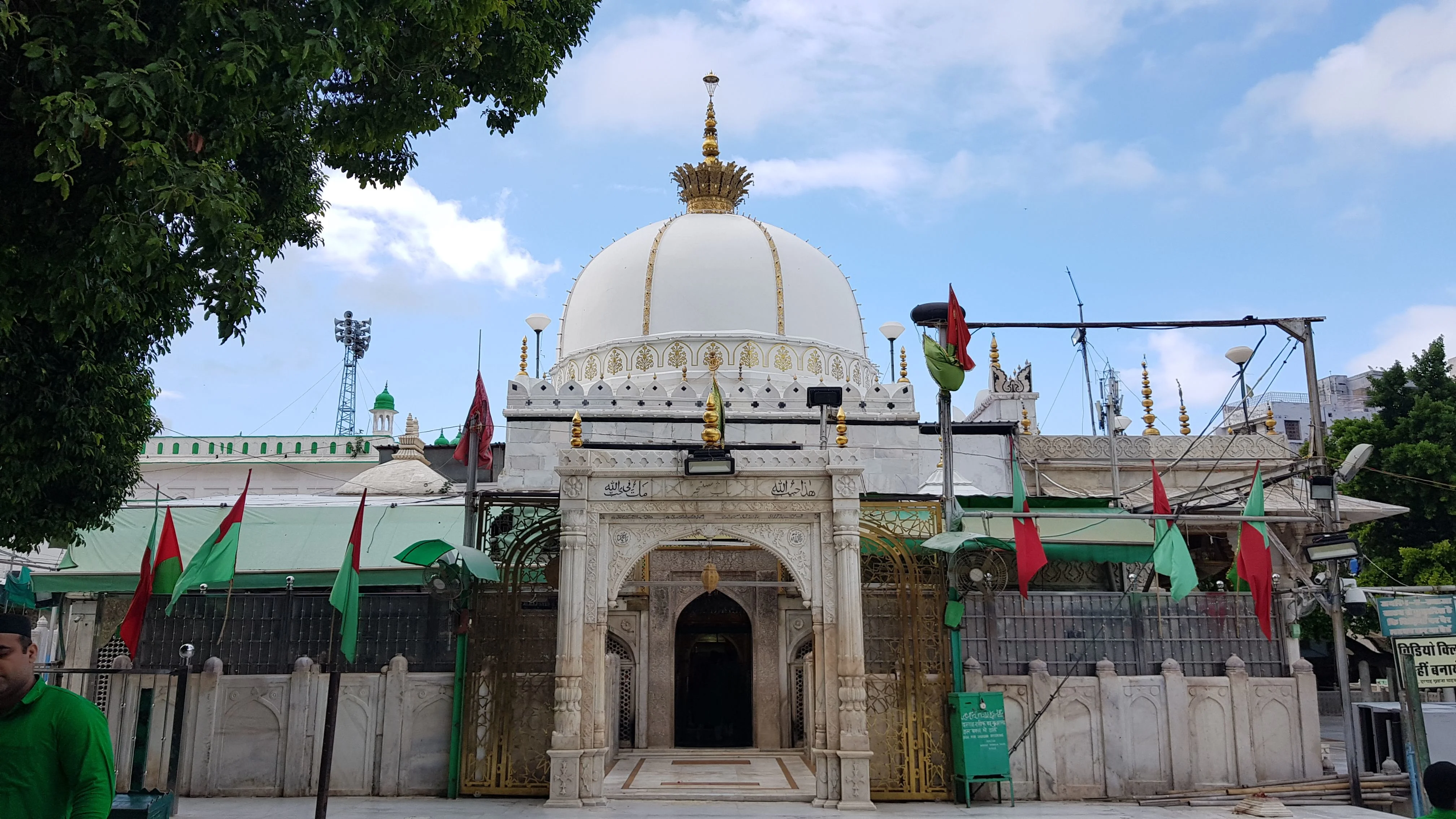
Dargah Ajmer Peaceful
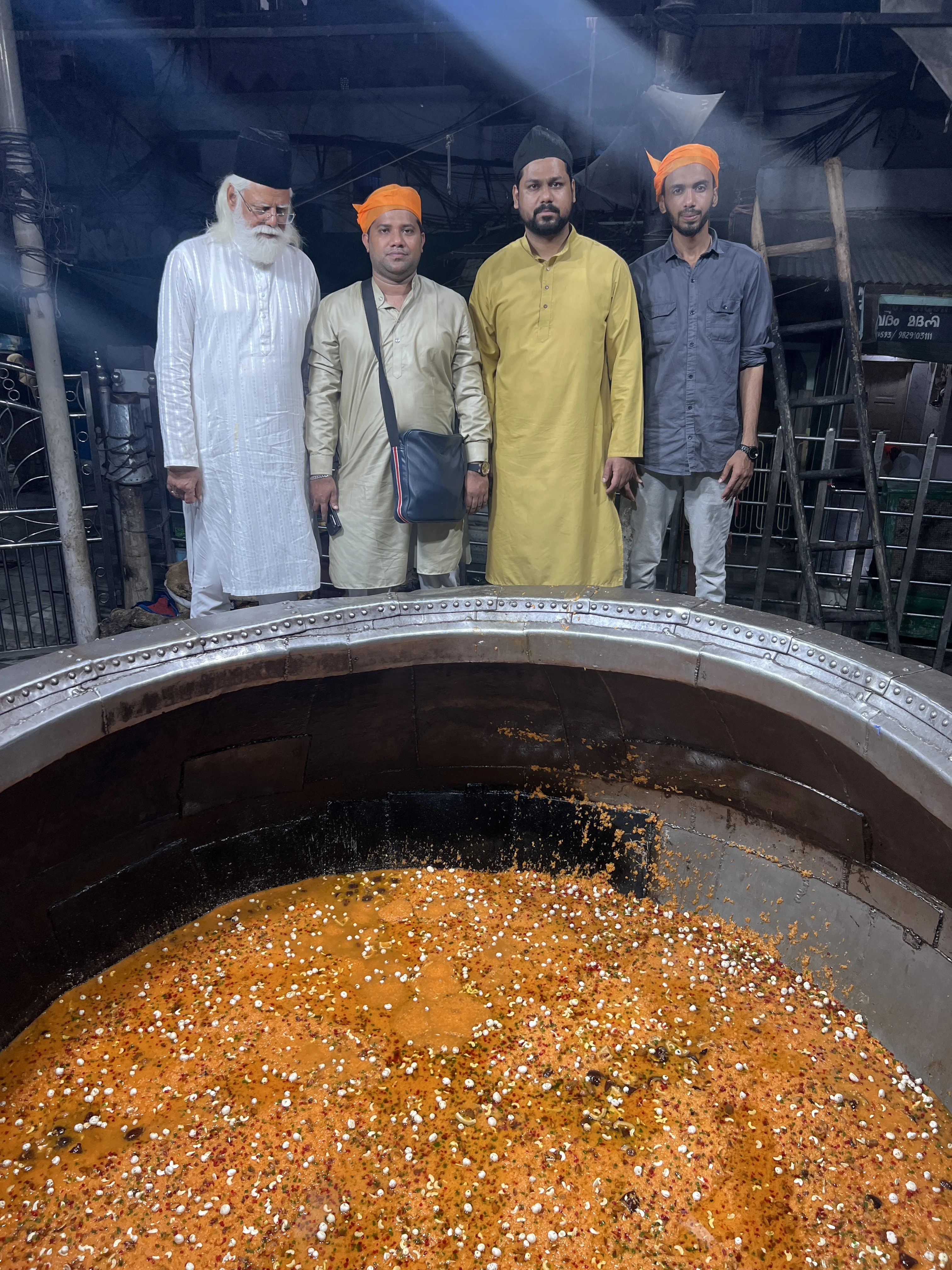
Ajmer Dargah Deg Prepared
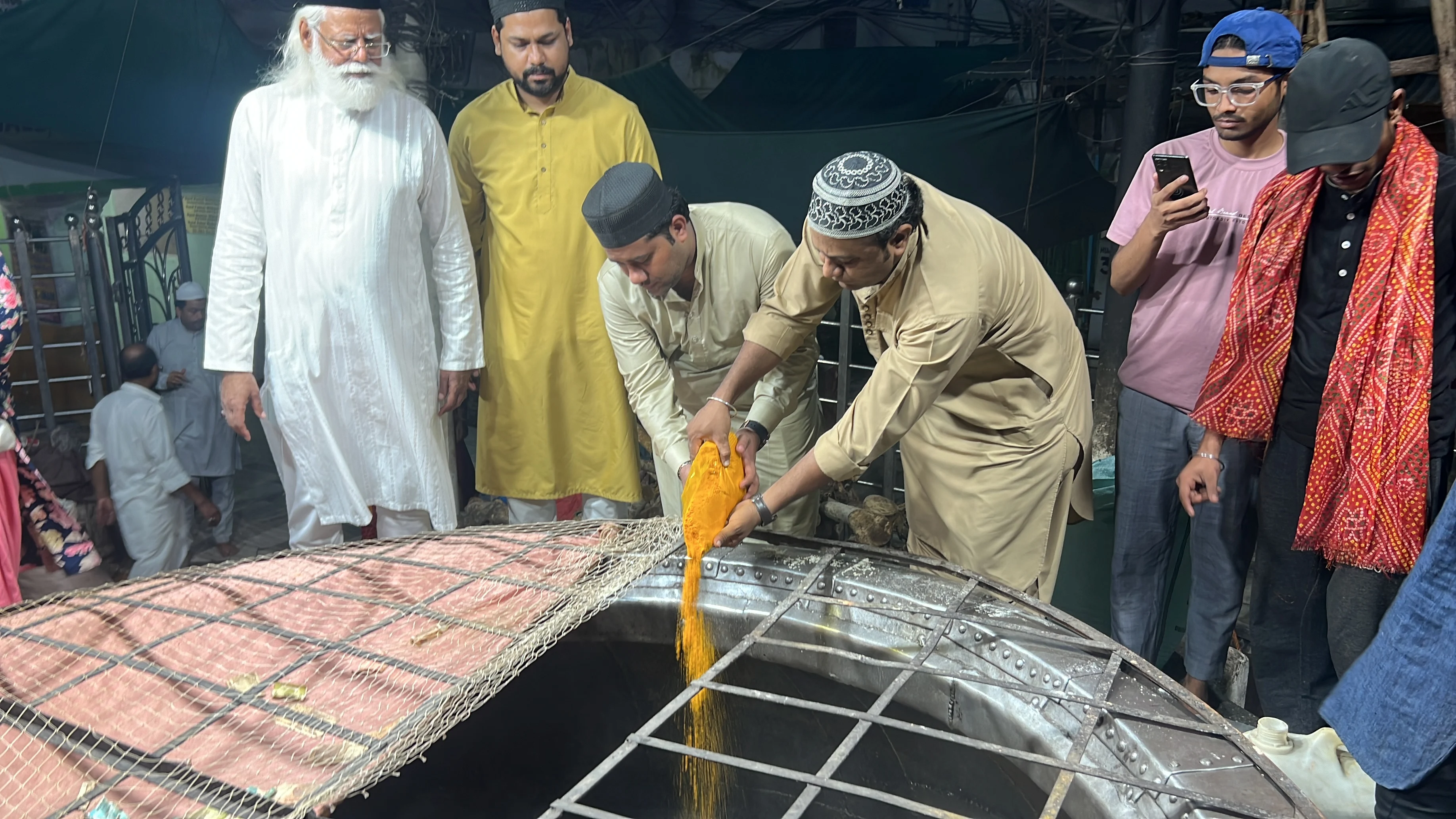
Deg Preparation Ajmer Sharif Gaddi Nashin Offering
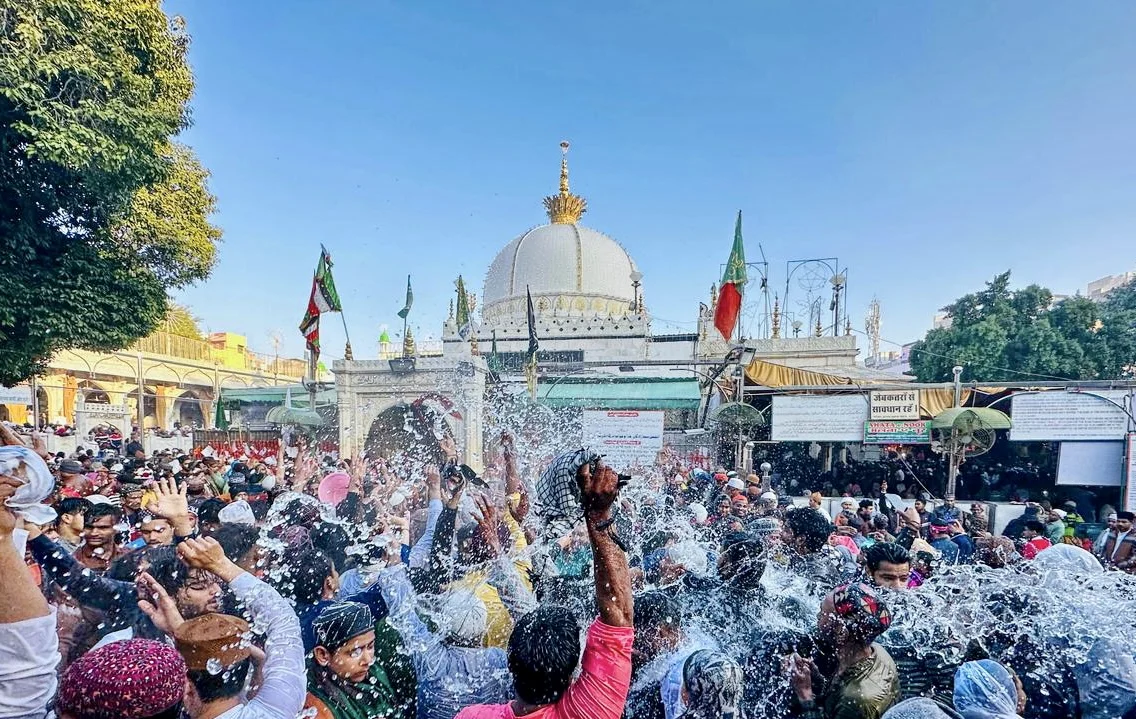
Urs Celebration Ajmer Sharif Dargah Devotees
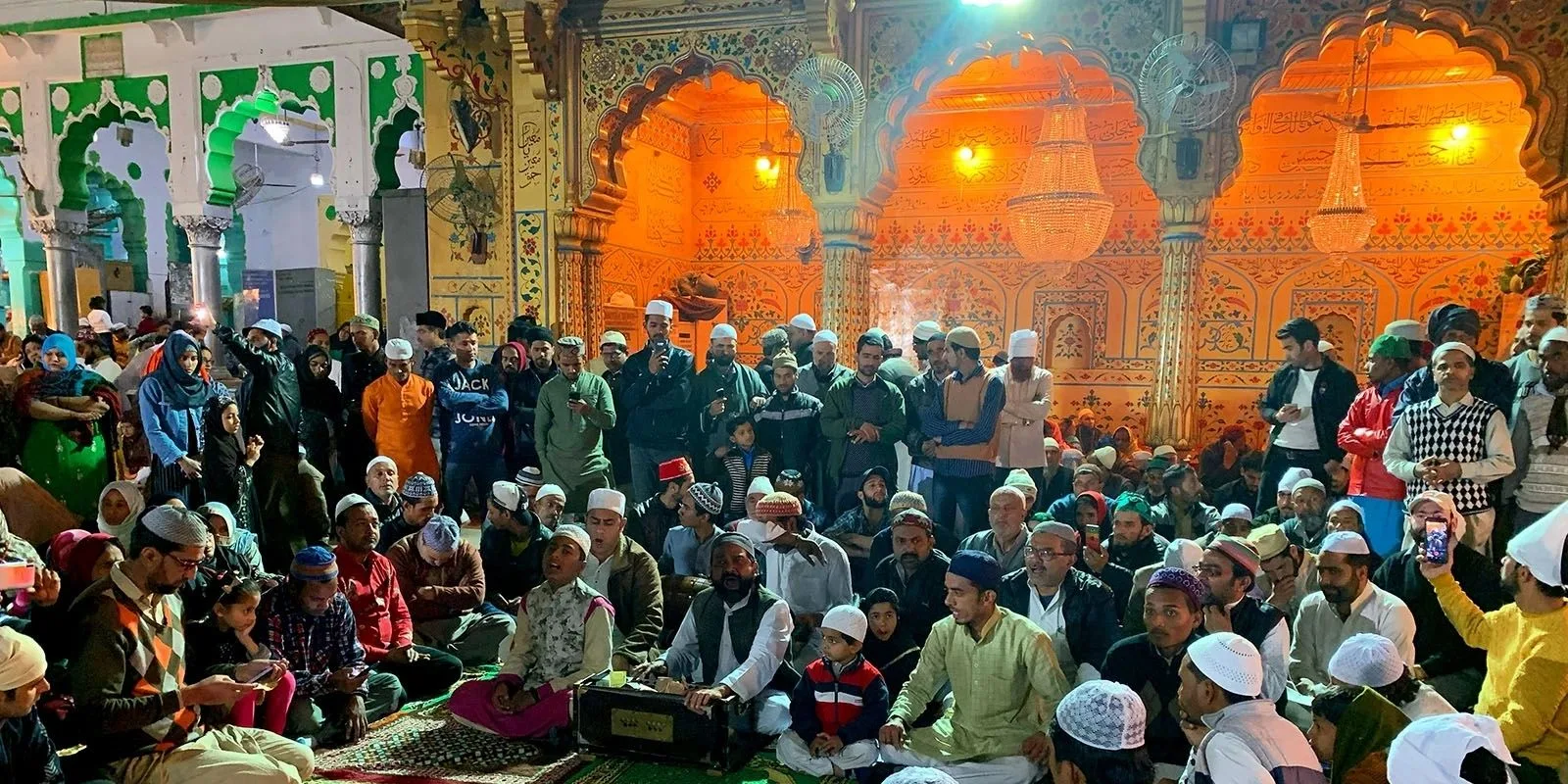
Ajmer Dargah Urs Qawwali
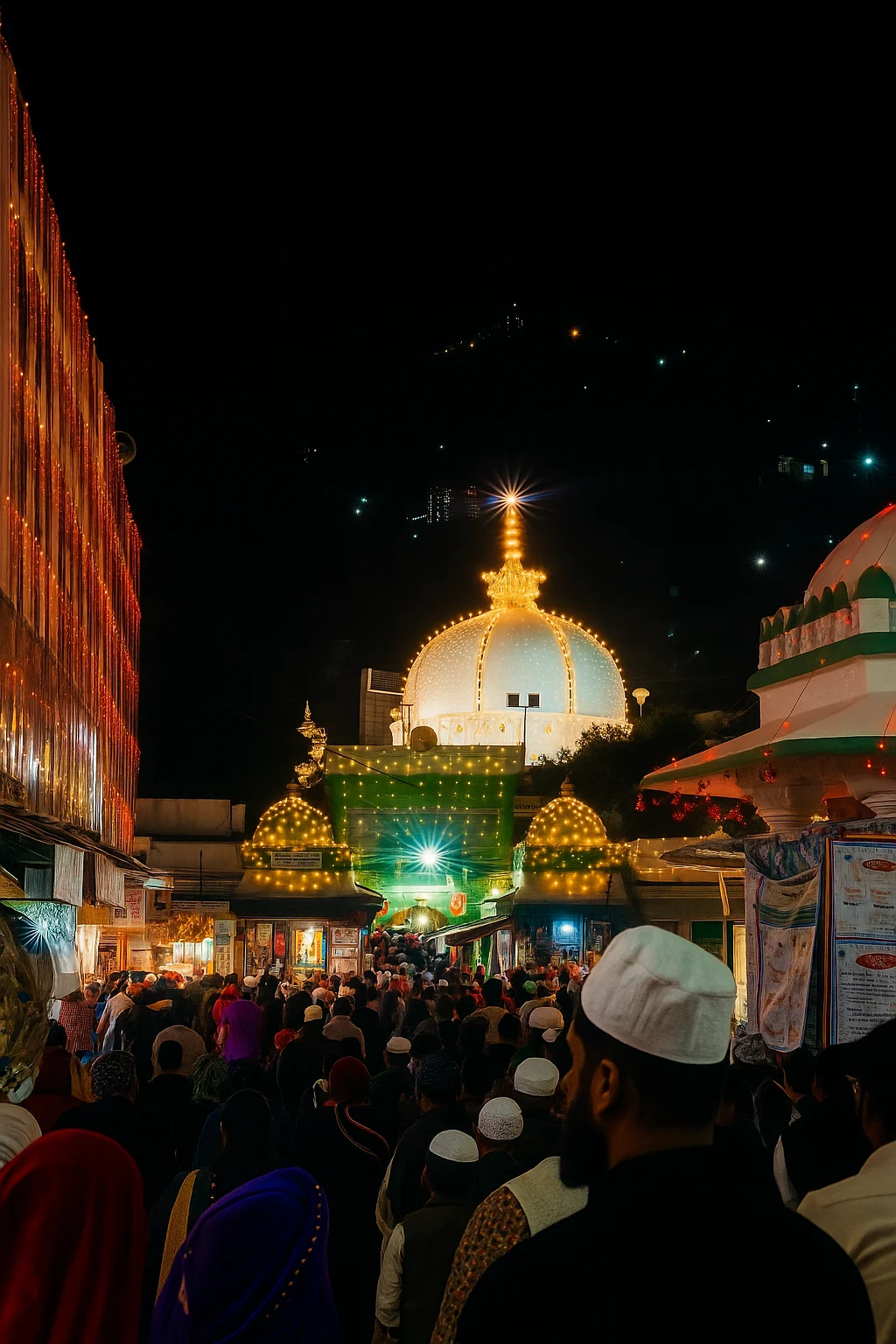
Ajmer Sharif Dargah Night Ziyarat Crowd
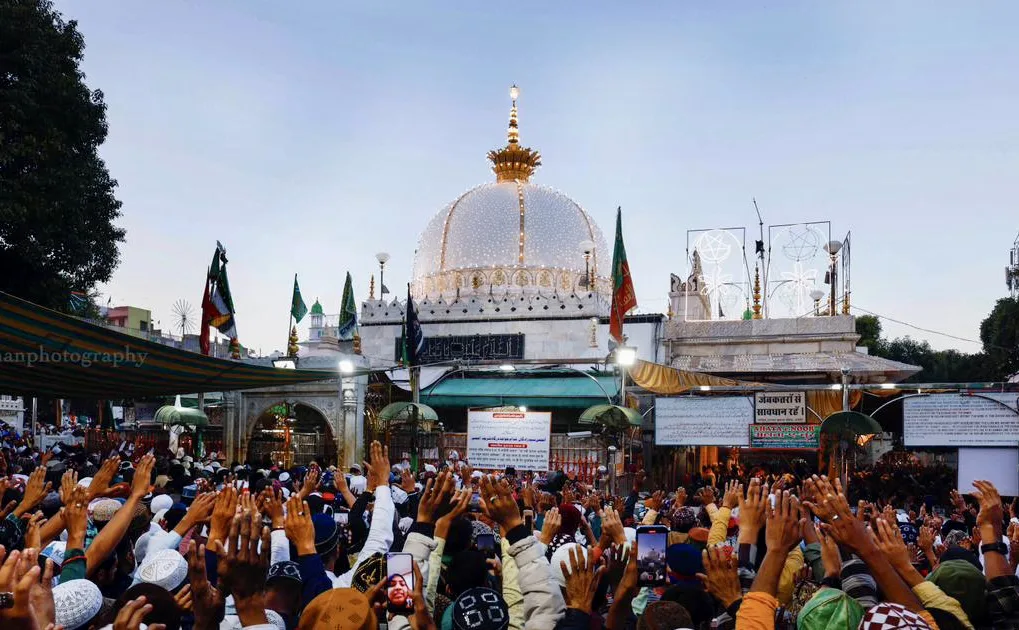
Roshni Time Ajmer Sharif Dargah Prayer Hands